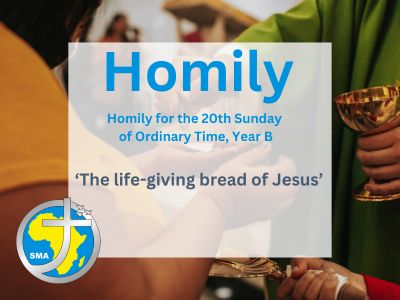Readings: Proverbs 9:1-6; Ephesians 5:15-20; John 6:51-58
Theme: The life-giving bread of Jesus
Today’s gospel reading continues where last Sunday’s ended with Jesus identifying himself as ‘the bread of life’ (Jn 6:35) – the food that permanently satisfies our deepest hunger. In the gospel we have just heard, Jesus makes the even more astounding claim that the bread he is offering us is ‘[his] flesh, for the life of the world’ (Jn 6:51). When his audience react to this statement, saying ‘How can this man give us his flesh eat?’ (Jn 6:52), Jesus repeats his claim in even stronger language: ‘I tell you most solemnly, if you do not eat the flesh of of Son of Man and drink his blood, you will not have life in you’ (Jn 6: 53).
Jesus, of course, is not speaking literally? He was no advocate for cannibalism! What he is telling us is something profoundly spiritual and personal. To eat the flesh of Jesus and to drink his blood means to be totally united with him, and to be filled with his spirit. It means to take on board his vision, his ideas, his values, and to embrace his mission of establishing on earth God’s reign of justice, truth and love. It means opening our hearts to his word as it comes to us through the Scriptures, and allowing that word to direct our everyday decisions and choices. This is what we do when we celebrate the Eucharist, recalling and re-enacting the greatest act of love the world has ever known: Jesus’ life-giving death on the Cross. And, when we say ‘Amen’ as we receive his body and blood, we identify ourselves with his sacrifice, and commit ourselves to carrying our own crosses after Jesus, accepting the sufferings which come into our lives as a consequence of this commitment.
In today’s gospel, then, Jesus is inviting us to share in the feast of his life-giving love. This invitation echoes the theme of our first reading from the Book of Proverbs which introduces us to Lady-Wisdom, the personification of God’s wisdom. The reading tells us that Lady-Wisdom has built herself a house with seven pillars and prepared a lavish feast of meats, bread and wine. She then sends her maidservants to invite people along, summoning all who lack wisdom to leave their folly behind and come to the feast where a different menu awaits them: ‘Come and eat my bread, drink the wine I have prepared! Leave your folly and you will life, walk in the ways of perception’ (Prov 9: 5-6). At a time like ours when wisdom is in short supply, this invitation is perhaps more relevant than ever.
What this invitation involves is expressed in more specific terms by St Paul in our second reading today. Speaking to the Christian community of Ephesus he warns them to be careful about the sort of lives they lead. They must not be misled by the wickedness of the world around them. Instead of wasting their lives in the mindless pursuit of pleasure, they must strive to live thoughtful lives, centred on discerning God’s will for them, blessed by the wine of the Holy Spirit, and marked by constant gratitude. Instead of adapting to the spirit of the times, they must become sources of healing and renewal for the world: ‘This may be a wicked age’ but you redeem it’ (Eph 5:16).
I imagine St Paul would make the same appeal to us today. I think he would also agree with the exhortation of the German poet, Rainer Maria Rilke, to live lives more in accord with ‘earth’s intelligence’:
If we surrendered
to earth’s intelligence
we could rise up rooted, like trees.
Instead we entangle ourselves
in knots of our own making
and struggle, lonely and confused.
So like children, we begin again
to learn from things,
because they are in God’s heart;
they have never left him.
To live in this way is to come to the feast Lady Wisdom has prepared for us. Is to live wisely and become what we are called to be as children of God.
When we participate in the Eucharist and receive the body and blood of Christ, we affirm our deepest identity as members of Christ’s body, called to be sources of healing and renewal for the world of our time. We are saying we want to be with Jesus totally and unreservedly, to serve him with all our hearts and work with him for the making of a better world: a world of truth and love, a world of justice and peace, a world of freedom and happiness. When we see ourselves as really part of that great endeavour, then we know that in a very real sense we have eaten his flesh and drunk his blood. I will end with a poem on the theme of Jesus as the bread of life from the pen of Malcolm Guite:
Where to get bread? An ever-pressing question
That trembles on the lips of anxious mothers,
Bread for their families, bread for all these others;
A whole world on the margin of exhaustion.
And where that hunger has been satisfied
Where to get bread? The question still returns
In our abundance something starves and yearns
then comes One who speaks into our needs
We crave fulfillment, crave and are denied.
And Who opens out the secret hopes we cherish
Whose presence calls our hidden hearts to flourish
Whose words unfold in us like living seeds
Come to me, broken, hungry, incomplete,
I Am the Bread of Life, break Me and eat.
Click on the play button below to listen to an alternative homily from Fr Tom Casey SMA.

